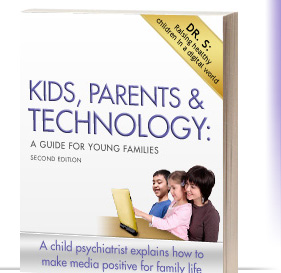Please join us on LinkedIn at ZILLYDILLY USERS and GROUP!
MyDigitalFamily, ZillyDilly, and/or Dr. S have no business nor other commercial interests in the publications or sites listed here and bring them to your attention solely because we think they will be of interest to you.
Readings
- Boston researchers Lawrence Kutner and Cheryl Olson’s very readable Grand Theft-Childhood (Simon & Schuster, 2008, ISBN 10 0-7432-9951-5) is a fascinating, balanced current study of video games and includes practical advice for parents in the last chapters.
- Born Digital (Basic Books, 2008, ISBN 978-0-465-00515-4) by attorneys John Palfrey and Urs Gasser is a superb and readable description of the challenges and rewards facing our current generation of children.
- Dade Hayes, a father and superb journalist, details his own study of how children’s media has evolved into the enormously profitable industry and how ‘money rules’ the merchandising spin-offs aimed at preschoolers, now so much part of our culture in Anytime Playdate (Free Press, 2008, ISBN 10: 1-4165 4683-9.)
- Children, Adolescents, and Media Violence (Steven, J. Kirsh, Sage Publications, 2006, ISBN: 0-7619-2876-2) is a readable, balanced, and well thought out, and well-organized guided tour of the actual empirical research on the passionate decades-long debate.
- Handbook of Children and the Media edited by pioneers and scholars Dorothy G. Singer and Jerome L. Singer (Sage Publications, 2001, 0-7619-1955-4) is the authoritative and comprehensive compendium of research, scholarly works, and sourcebook current as of the publication date.
- Editors Miriam J. Metzger and Andrew J. Flanigan assembled scholarly writings on positive and negative aspects of Digital Media, Youth, and Credibility (The MIT Press, 2008, ISBN: 978-0-262-56232-4.)
- Editor Tara McPherson gathers fascinating writings about Digital Youth, Innovation, and the Unexpected (The MIT Press, 2008, ISBN: 978-0-26263359-8.)
- James P. Steyer, a well-connected parent and advocate writes a scathing critique of the children’s media industry and provides suggestions to parents (The Other Parent, Atria Books, 2002, ISBN: 0-7434-0583-8.)
- The Wired Homestead? (M.I.T. Press, 2003 , ISBN -10: 0262700948), edited by Joseph Turow and Andrea L. Kavanaugh, is an outstanding, must-read scholarly sourcebook that offers up-to-date essays, review articles, and original research by superb leading thinkers. The breadth and depth of current thinking and the scholarly work of most of the first-rate pioneers in this area promise a prolific future of vital research that deserves public support.
- Children in the Digital Age (Praeger, 2002, ISBN 1- 0275976521), edited by Sandra L. Calvert, Amy B. Jordan, and Rodney R. Cocking, has earlier but worthwhile scholarly essays, review articles, and several actual original studies by leading scholars on TV and the Internet, and is a must read for those serious about this subject.
- In Generation Digital (M.I.T. Press, 2007, ISBN 10: 0262134780), scholar and self-admitted activist Katherine C. Montgomery summarizes the historical struggle for control of children’s minds between family and child development advocates and diverse merchandising, e-commerce, entertainment, and civil liberty forces. The author describes how, having succeeded for decades with sophisticated marketing techniques in TV, commercial interests are now revving up powerful interactive media techniques to bypass parents and reach directly into playpens and playgrounds to capture ever-younger naïve consumers.
- Kaiser Family Foundation, Generation M2: Media in the Lives of 8 to 18-Year-Olds http://www.kff.org/entmedia/entmedia012010nr.cfm
- Wired Magazine, Disney PARENT SURVEY 2008
- Buy, Buy Baby (Houghton Mifflin Company, 2007, ISBN 10:0-618-46351-8) by Susan Gregory Thomas, a very capable journalist and mother, gives an intelligent, excellent, readable, extremely informative, and very well-written discussion of the spread of the marketing culture into the lives of babies and their parents.
- Reporter and mother Lisa Gurnsey provides an excellent, readable, intelligent, and balanced review of current research on the effects of interactive media on the cognitive and emotional development of preschoolers in Into the Minds of Babes (Basic Books, 2007, ISBN 10: 0-465-02798.)
- Research beginning early in the century that demonstrated the importance of early detection and prevention has resulted in many techniques and psychiatric interventions. (Romer, Daniel, and Walker, Elaine F. (eds), Adolescent Psychopathology and the Developing Brain: Integrating Brain and Prevention Science. Oxford University Press. New York (2007), especially part IV.)
- An excellent readable summary of the impact of TV by Drs. Christakis and Zimmerman, child development specialists at the University of Washington (The Elephant in the Living Room, Rodale, 2006, ISBN-10:1594862761.)
- A wonderful resource for beginning to teach media literacy is the Center for Media Literacy, Reading Room (https://ddmedia.com.au/cml/reading-room/) and the US government’s Sources.
- Healthy brain maturation and psychological development through childhood and adolescence and beyond depend on how your child advances along two basic interwoven processes: separation and individuation (Mahler, M. (1979). The Selected papers of Margaret S. Mahler: Separation-Individuation, volume II, NY.)
- Experts have long understood that infants attempt to master their early days by inventing a clever halfway measure to assist their transition: an attachment to a transitional object (Winnicott, D.W. (1971). Playing and Reality. New York. Basic Books.)
- Alone Together: Why We Expect More from Technology and Less from Each Other (Basic Books, 2011) is must reading for anyone who has a cell phone; and a must MUST if you also have a child. Dr. Sherry Turkle, a first rate thinker, veteran researcher, and keen observer, surprises us with how thoroughly and rapidly the evolving human-machine interface is changing our lives. Dr. Turkle’s findings suggest that some major fundamental human brain / mind processes that underlie our uniquely human feeling, thinking, and social interactions have been shifting in subtle but powerful ways. I found the book excellent, at times dense, and always a page turner.



